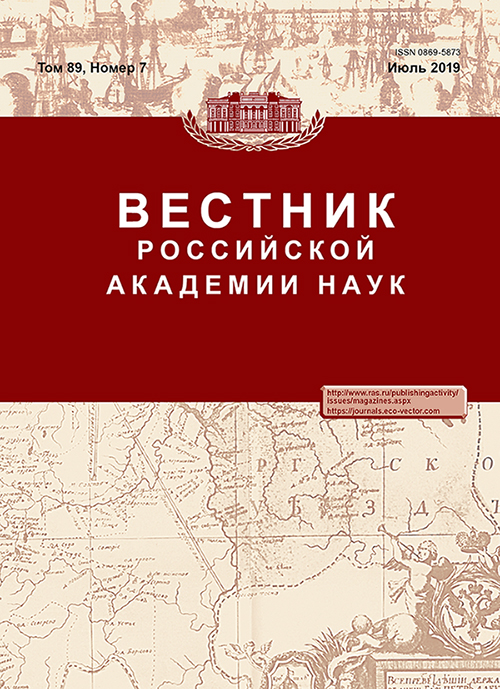Vol 89, No 7 (2019)
- Year: 2019
- Articles: 9
- URL: https://journals.eco-vector.com/0869-5873/issue/view/913
НАУКА И ОБЩЕСТВО
Development of land relations in the agro-industrial complex
Abstract
This article analyzes the results and consequences of land and agrarian reforms in Russia and investigates the main directions of land policy improvement. The dynamics of the ownership structure, as well as the forms and types of land use in agricultural organizations, indicate the incompleteness of land transformations and misunderstanding of the direction of subsequent development. An assessment of the state land policy indicates its uncertainty in a number of critical positions and the inadequate response of the land administration system to the modern requirements of socioeconomic development. Its inefficiency gave rise to the lack of information on the composition and quality of land parcels, accelerating degradation of agricultural lands, criminalization of land relations, insecurity of small agribusinesses, and unprecedented growth of latifundia, among other negative trends. Registered agricultural lands constitute a little more than 20%. The boundaries of political units are not established, which leads to land disputes and insecurity of agricultural producers’ rights. The destruction of institutions for planning and forecasting; the use and protection of lands; and land management, monitoring, re-cultivation, and anti-erosion measures all led to the desertification of large areas, progress of water and wind erosion, soil salinization, and other degradation processes. To improve the current situation, we propose that a system of urgent measures be implemented.
 669-677
669-677


Economic and geographic aspects of new industrial and transport construction in Russia
Abstract
The author conducted an inventory of investment projects implemented in post-Soviet Russia to determine the trends of the territorial organization of industry that are associated with the new construction. An exceptionally high territorial differentiation of industrial construction was revealed, which is expressed in its concentration in a small number of industrial areas and overconcentration in metropolitan regions. The total fragmentation of the single national economic complex in the course of market reforms is being replaced by an unstable trend of spontaneous complex formation. The analysis of the structure of new industrial construction did not reveal any signs of its greening. Two-thirds of the new projects involve the basic, ecologically aggressive sectors. The newly constructed transport infrastructure facilities are largely export-oriented rather than being enhancers of the connectivity of their territories. This vector of territorial development in Russia is negative from both geopolitical and environmental positions.
 678-687
678-687


ОРГАНИЗАЦИЯ ИССЛЕДОВАТЕЛЬСКОЙ ДЕЯТЕЛЬНОСТИ
Global experience of interaction with scientific diaspora: lessons for Russia
Abstract
International experience has shown that close cooperation with the national scientific diaspora is crucial to strengthening the scientific and technical potential of a society. A review of academic papers revealed specific features of the global movement of scientific personnel, which causes, among other things, mutually beneficial cooperation of emigrant scientists and the donor country. For example, China, India, Korea, Taiwan, and Iran have instituted successful policies with regard to national scientific diasporas. However, the literature reveals that in Russia measures in this direction instituted by the state are inconsistent. In this study, the authors formulate proposals that should contribute to the expansion of interaction with the Russian scientific diaspora.
 688-698
688-698


Scientific cooperation of Russia with post-soviet states. Evaluation by publications indexed in Web of Science
Abstract
The article defines the current state and dynamics of the scientific cooperation between Russia and non-Baltic post-Soviet states by studying researchers’ scientific co-publications indexed in the Web of Science. The statistics on the number of Russian and post-Soviet authors’ bilateral scientific articles in 2000–2017 were analyzed, as well as distribution of the articles by publication year, area of research, main sponsors, and authors’ organizational affiliations. Four groups of countries were specified, for which the dynamics of scientific publication cooperation with Russia can be described as growing, positive, stagnating, and dwindling respectively. The main areas of scientific cooperation between Russia and post-Soviet states were identified in general and for each partner country in particular, as well as the leading cooperating organizations, key areas of joint research, and major research sponsors. The comparative relevance of co-publications for the scientific community was evaluated through scientific citation indexes for each post-Soviet partner country and each key area of research. The valuable role of higher education institutions in maintaining scientific cooperation in the context of adverse political and economic environments was specified.
 699-717
699-717


ПРОБЛЕМЫ ЭКОЛОГИИ
Environmental aspects of sustainable development
Abstract
The term "sustainable development" is based on the fundamental principle of improving human quality of life without destroying the natural environment (the biosphere). Humankind develops through the consumption of renewable (air, water, landscapes, and biota) and nonrenewable (fuel, ores, and other mineral resources) resources from the Earth. Constant renewal of resources is an essential condition for sustainable development. However, the present-day use of nature ignores this requirement, which inevitably leads to the depletion of resources, degradation of ecosystems, and global ecological disaster. This paper considers the modern level of consumption of life-supporting resources, which exceeds the permissible limits, and possible ways to prevent the approaching disaster. We draw several conclusions regarding the necessity to adopt a radically new nature-use strategy on the bases of the rational use and reproduction of resources as well as the development of new technologies of energy production from nontraditional sources.
 718-727
718-727


Point of view
Common digital space of scientific knowledge
Abstract
The article attempts a comprehensive analysis of the concept and phenomenon of the common digital space of scientific knowledge (CDSSK) as a narrower wording of the concept of the common Russian electronic space of knowledge, which is proposed in a number of government documents. Definitions of basic concepts are proposed in relation to this phenomenon. Goals, objectives, composition, and structure are considered to be the boundaries and the principles of creating CDSSK. A brief overview of the existing scientific information resources and services that have the features of the elements of space of scientific knowledge follows. It is concluded that the existing information resources can be sources of CDSSK but not its components. The paper proposes a structure for CDSSK, including static and dynamic components (base and add-in), various levels of knowledge representation, and core and periphery. This should include formalized knowledge over which a set of operations and the periphery – the sources of this knowledge (including documents) – are selected on the basis of quality. The logical structure of CDSSK must submit its ontology, formed as it ought to be on the basis of information languages and metadata of existing scientific information resources. A number of steps are proposed to organize the work of creating CDSSK, as well as its content and support.
 728-735
728-735


ИЗ РАБОЧЕЙ ТЕТРАДИ ИССЛЕДОВАТЕЛЯ
The labor potential of Russia: demographic and socioeconomic problems of formation and usage
Abstract
The article clarifies the term "labor potential", considering modern scientific approaches. The peculiarities of the formation of labor potential are reflected in the conditions of the second wave of depopulation. The main directions of employment expansion due to the increase of labor activity of social and demographic population groups are considered. These groups include youth, invalids, and pensioners. The specificity of structural shifts in employment in comparison with developed Western countries is revealed. The role of re-emigration and external and internal labor migration in achieving a balance of demand and supply of labor is noted. Proposals on the main directions of the strategy of development and usage of labor potential are also given.
 736-744
736-744


ЗА РУБЕЖОМ
World trade wars: new impact estimation tools
Abstract
This article provides an overview of the most well-known tools for quantifying the effects of trade wars. The most famous and highly cited works are analyzed. In these works, mathematical models that view the economic systems of several states and participants of international relations at the same time are considered, analysis of which revealed a certain bias of results in favor of individual countries, as well as the lack of consideration of the specific features of the economic systems of most of the subjects considered. In the next work, which is a continuation of this article, we will provide information regarding the model complex being developed for assessing the effects of intercountry trade wars, allowing us to carry out calculations of measures aimed at other countries that are against Russia and China and present the results obtained.
 745-754
745-754


Scientifical life
The crisis of the new western sociological schools. That showed the XIX congress of the ISA?
Abstract
In the article the authors analyze the development of Western sociological science during 20 years that have passed between the 14th and 19th ISA Congresses held in Canada (in Montreal – in 1998 and Toronto –in 2018, respectively) and claim the crisis state of Western sociology at the moment, largely due to the departure and rejection of basic research, the transition mainly to applied and reduced professionalism in the sociological sphere. Since the Congress of the International Sociological Association is the largest scientific event, it is of interest to evaluate the results of sociological research presented in the reports of the participants, to analyze the methods used and the chosen scientific directions, as well as the potential of sociologists. And the 19th ISA Congress showed that along with the Western sociological schools that are currently experiencing a crisis, new sociological schools are being formed in South Africa and Australia, which have achieved noteworthy results.
 755-761
755-761












